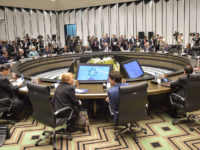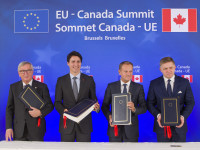In the months following the conclusion of the Trans Pacific Partnership, critics pointed to many specific problems in the text with respect to intellectual property, culture, privacy, and dispute resolution. TPP defenders consistently dismissed those concerns, yet last week’s successful Canadian demand to suspend many of the most problematic IP provisions (along with holding out for reforms to the cultural exemption) confirms that the government has recognized the validity of the criticisms. The government may yet cave to U.S. pressure in the NAFTA renegotiation, but it has established a clear position on culture and IP that better reflects the national interest.
Post Tagged with: "patents"
The TPP is Back: My Submission on the Canadian Government’s TPP11 Consultation
The Trans Pacific Partnership, once left for dead after U.S. President Donald Trump withdrew from the agreement, is back with negotiations on a TPP11 (the original agreement featured 12 countries) set to resume next week. With reports indicating that dozens of provisions may be suspended, the Canadian government just concluded a public consultation on the issue. My full submission is posted below. It expresses concern with the lack of TPP transparency and provides comments on five substantive areas: dispute settlement, copyright, patents, e-commerce/digital trade, and culture.
Just Passing Through: Why Canadian Anti-Counterfeiting Law Should Not Permit In-Transit Shipment Searches
As Canadian officials prepare for the forthcoming NAFTA renegotiation, changes to Canada’s border measures provisions seem likely to surface as a U.S. demand. Late last month, the USTR released its annual Special 301 report and the issue of Canadian anti-counterfeiting law – in particular, the absence of provisions to allow for the search of in-transit shipments that are not bound for Canada – topped the list of concerns. The U.S. report states:
The United States remains deeply concerned that Canada does not provide customs officials with the ability to detain, seize, and destroy pirated and counterfeit goods that are moving in transit or are transshipped through Canada. As a result, the United States strongly urges Canada to provide its customs officials with full ex officio authority to address the serious problem of pirated and counterfeit goods entering our highly integrated supply chains.
The U.S. position has garnered some support in Canada. For example, a recent Globe and Mail editorial urged the government to change the 2014 anti-counterfeiting law by granting customs agents the power to search and seize shipments that are not bound for Canada.
CETA Implementation Bill Provides Reminder of the IP Cost in the Canada – EU Trade Deal
The Canadian government moved quickly from signing the trade agreement between Canada and the European Union on Sunday to tabling Bill C-30, the CETA implementing legislation, on Monday. While most of the attention has focused on the political issues surrounding CETA in Europe and the potential gains for Canadian exporters due to tariff reductions, the implementing bill provides a reminder that there are significant costs associated with CETA that have generated far less discussion. In fact, the majority of the 140-page bill features changes to Canada’s intellectual property rules, requiring changes that largely serve European interests.
Mandated reforms to patent protections (in the form of term restoration provisions) and the expansion of protections for dozens of European geographical indications was always part of the price to be paid for CETA. There were concerns expressed throughout the negotiations on both issues. Geographic indications rules grant protections to foods widely produced around the world and establish new marketing and naming restrictions on Canadian food producers. Meanwhile, the patent term restoration provisions are likely to increase health care costs in Canada by delaying the availability of generic pharmaceuticals due to the extension in the term of protection for patented pharmaceuticals.
The Devil is in the Details: Why CETA is on the Verge of Collapse
The seeming collapse of the trade agreement between Canada and the European Union (CETA) has created obvious disappointment for International Trade Minister Chrystia Freeland and the entire Canadian government, which made the deal as its top trade issue. Efforts to salvage CETA will undoubtedly continue, but my Globe and Mail column points out that the underlying problem with the agreement is not the complicated European political system that requires support from all member states.
Rather, it is the expansion of trade negotiations from agreements that once focused primarily on tariff reductions to far broader regulatory documents that now mandate domestic legal reforms and establish dispute resolution systems that can be result in huge liability for national governments. This enlarged approach to trade deals, which can also be found in the controversial Trans Pacific Partnership (TPP), run the risk of surrendering domestic policy choices to other countries or dispute tribunals.
If CETA were limited to tariff reductions, it would be relatively uncontroversial. The discomfort with the agreement lies instead in the mandated changes to domestic regulations and the creation of investor – state dispute settlement mechanisms that may prioritize corporate concerns over local rules.











